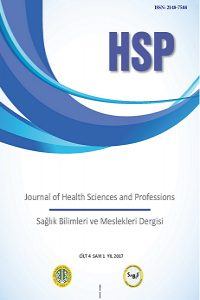Abstract
Aim: This study was conducted in order to determine the experiences of students in the pediatric oncology clinic. Material and Methods: The study was performed between March and May 2014 in the Health Vocational School of a university. The universeof the study consisted of 30 students who were in their junior year in the 2013 2014 academic year and who chose “pediatric oncology nursing” as a selective course. The study was conducted via in depth interviews with 14 students who chose this course and volunteered to participate in the study. A semi structured questionnaire was used in the interviews. Results: In the study, a majority of the students stated that they experienced nervousness, fear, and anxiety before first entering the service, that they had difficulties communicating with children and their families, and that this was especially the case when talking to both children and families about the disease. They stated that they had insufficient knowledge on approaching a child with cancer and his/her family, and all of the students stated that they were deeply affected by the intervention processes applied to the children. They also stated that, compared to other pediatric services, they thought that the communications of the doctors and nurses in the service were better with the children and their families. Conclusion: A need for developing the communication skills of the students for communicating with cancer patients and their families was determined. Their qualifications are suggested to be raised through trainings on the subject, and interactive environments where they can state the cases where they have difficulties are suggested to be formed.
References
- Warbah L, Sathiyaseelan M, Vijayakumar C, Vasantharaj B, Russell S, Jacob KS. Psychological distress, personality, and adjustment among nursing students. Nurse Education Today 2007; 27: 597-601.
- Kurt AS, Çetinkaya Ş. Lösemili çocuklarda yaşam kalitesi ve hemşirelik bakımı. Fırat Sağlık Hizmetleri Dergisi 2008; 3(8): 35-56.
- Oermann MH, Lukomski AP. Experiences of students in pediatric nursing clinical courses. Journal for Specialists in Pediatric Nursing 2001; 6(2):65-72.
- Elcigil A, Conk Z. Determining the burden of mothers with children who have cancer. Dokuz Eylül Üniversitesi Hemşirelik Yüksekokulu Elektronik Dergisi 2010; 3(4):175-81.
- Kostak MA, Avci G. Hopelessness and depression levels of parents of children with cancer. Asian Pacific Journal of Cancer Prev 2013; 14(11): 6833-6838.
- İrem Tunçel Y, Kaya M, Kuru N, Menteş S, Ünver S. Onkoloji hastanesi yoğun bakım ünitesinde hemşirelerin tükenmişlik sendromu. Türk Yoğun Bakım Derneği Dergisi 2014; 12:57-62.
- Tiwari A, Lam D, Yuen KH, Chan R, Fung T, ChanS. Student learning in clinical nursing education: Perceptions of the relationship between assessment and learning. Nurse Education in Practice 2005; 25: 299-308.
- Sibson L, Machen I. Practice nurses as mentorsfor student nurses: An untapped educational resource? Nurse Education in Practice 2003; 3:144-154.
- Donaldson JH, Carter C. The value of role modelling: perceptions of undergraduate and diploma nursing students. Nurse education in practice 2005; 5: 353-359.
- Oermann MH, Standfest SL. Differences in stress and challenge in clinical practice among ADN and BSN students in varying clinical courses. Journal of Nursing Education 1997; 36(5): 228-233.
Abstract
Amaç: Çalışma hemşirelik öğrencilerinin çocuk
onkoloji kliniğindeki deneyimlerini belirlemek amacıyla yapılmıştır. Gereç
ve Yöntem: Çalışma Mart-Mayıs 2014 tarihleri arasında bir
üniversitenin Sağlık Yüksekokulu’nda gerçekleştirildi. Çalışmanın evrenini
2013-2014 akademik yılı bahar döneminde üçüncü sınıfta eğitim gören ve seçmeli
derslerden “çocuk onkoloji hemşireliği” dersini seçen 30 öğrenci oluşturdu.
Çalışma bu dersi seçen ve çalışmaya gönüllü olarak katılmak isteyen 14 öğrenci
ile derinlemesine görüşme yapılarak gerçekleştirildi.
Görüşmelerde yarı yapılandırılmış soru formu kullanıldı. Bulgular: Çalışmada, öğrencilerin çoğunluğu servise ilk girmeden
önce tedirginlik, korku, anksiyete yaşadıklarını, çocuk ve aile ile iletişime
geçmekte sıkıntı yaşadıklarını özellikle hem aile hem de
çocukla hastalık hakkında konuşurken çok sıkıntı yaşadıklarını ifade etti.
Kanserli çocuk ve ailesine yaklaşımla ilgili bilgilerinin yetersiz olduğunu ve öğrencilerin tümü çocuklara uygulanan
girişimsel işlemlerden çok etkilendiklerini belirtti. Servisteki hekim ve hemşirelerin aile ve çocukla iletişimlerinin diğer
çocuk servisleri ile kıyasladıklarında çok iyi olduğunu ifade etti. Sonuç:
Öğrencilerin kanserli hasta ve ailesiyle iletişim
becerilerinin geliştirilmesinin gerekli olduğu belirlenmiştir. Buna yönelik
eğitimler ile yeterliliklerinin arttırılması; güçlük yaşadıkları durumları
ifade edebilecekleri etkileşim ortamlarının oluşturulmasının sağlanması
önerilmektedir.
References
- Warbah L, Sathiyaseelan M, Vijayakumar C, Vasantharaj B, Russell S, Jacob KS. Psychological distress, personality, and adjustment among nursing students. Nurse Education Today 2007; 27: 597-601.
- Kurt AS, Çetinkaya Ş. Lösemili çocuklarda yaşam kalitesi ve hemşirelik bakımı. Fırat Sağlık Hizmetleri Dergisi 2008; 3(8): 35-56.
- Oermann MH, Lukomski AP. Experiences of students in pediatric nursing clinical courses. Journal for Specialists in Pediatric Nursing 2001; 6(2):65-72.
- Elcigil A, Conk Z. Determining the burden of mothers with children who have cancer. Dokuz Eylül Üniversitesi Hemşirelik Yüksekokulu Elektronik Dergisi 2010; 3(4):175-81.
- Kostak MA, Avci G. Hopelessness and depression levels of parents of children with cancer. Asian Pacific Journal of Cancer Prev 2013; 14(11): 6833-6838.
- İrem Tunçel Y, Kaya M, Kuru N, Menteş S, Ünver S. Onkoloji hastanesi yoğun bakım ünitesinde hemşirelerin tükenmişlik sendromu. Türk Yoğun Bakım Derneği Dergisi 2014; 12:57-62.
- Tiwari A, Lam D, Yuen KH, Chan R, Fung T, ChanS. Student learning in clinical nursing education: Perceptions of the relationship between assessment and learning. Nurse Education in Practice 2005; 25: 299-308.
- Sibson L, Machen I. Practice nurses as mentorsfor student nurses: An untapped educational resource? Nurse Education in Practice 2003; 3:144-154.
- Donaldson JH, Carter C. The value of role modelling: perceptions of undergraduate and diploma nursing students. Nurse education in practice 2005; 5: 353-359.
- Oermann MH, Standfest SL. Differences in stress and challenge in clinical practice among ADN and BSN students in varying clinical courses. Journal of Nursing Education 1997; 36(5): 228-233.
Details
| Subjects | Health Care Administration |
|---|---|
| Journal Section | RESEARCH ARTICLE |
| Authors | |
| Publication Date | February 9, 2017 |
| Published in Issue | Year 2017 Volume: 4 Issue: 1 |


